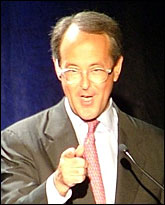- Erskine Bowles
Infobox US Cabinet official
name=Erskine Boyce Bowles

imagesize=150px
order=19th
title=White House Chief of Staff
term_start=1997
term_end=1998
predecessor=Leon Panetta
successor=John Podesta
president=Bill Clinton
birth_date = birth date and age|1945|08|08
birth_place =Greensboro, North Carolina
death_date =
death_place =
nationality = American
party = Democratic
otherparty =
spouse = Crandall Close Bowles
partner =
relations =
children =
residence =
alma_mater =University of North Carolina at Chapel Hill Columbia University
occupation = 4th President of the University of North Carolina System
profession =Businessman ,Politician ,Administrator
net worth =
religion =
website =
footnotes =Erskine Boyce Bowles (born
August 8 ,1945 ) is an American businessman and political figure fromNorth Carolina . He currently serves as the president of theUniversity of North Carolina system. In 1997-98 he served asWhite House Chief of Staff and he also ran unsuccessfully for a North CarolinaUnited States Senate seat in 2002 and 2004.Early life and education
Bowles was born and raised in
Greensboro, North Carolina and is the son ofSkipper Bowles , a Democratic politician. Bowles graduated fromVirginia Episcopal School before attending college. Bowles matriculated at theUniversity of North Carolina at Chapel Hill , where he was admitted to theZeta Psi fraternity and graduated with a business degree. After briefly serving in theUnited States Coast Guard , Bowles then enrolled in theColumbia Business School , where he earned an M.B.A. and served asStudent Body President .Following graduation, Bowles worked for the financial firm
Morgan Stanley inNew York City . There, he met his wife, Crandall Close; the two married in 1971 and moved to North Carolina, where Bowles worked on his father's 1972 gubernatorial campaign. Crandall and Erskine have three children: Sam, Annie, and Bill. In 1975, Bowles helped launch the investment firm ofBowles Hollowell Conner , and remained in the corporate sector until the 1990s.The Clinton years
In 1992, he became more involved in politics as a fundraiser for
Bill Clinton 's 1992 presidential campaign. President Clinton appointed Bowles to head theSmall Business Administration in 1993. From October 1994 to December 1995, Bowles served as Clinton's deputy White House chief of staff, in the first-term of theClinton Administration .After briefly returning to
Charlotte, North Carolina , where he helped found theinvestment bank Carousel Capital , Bowles was appointed Clinton's Chief of Staff in December 1996. One of Bowles's major responsibilities was dealing with federal budget negotiations between the White House and Congress. Bowles returned toCharlotte, North Carolina and to the field of finance again in October 1998. He was also asked by North Carolina Gov.Jim Hunt to head a task force on rural economic prosperity.enatorial races
Although initially reluctant to seek political office, Bowles reconsidered a run for the
United States Senate after theSeptember 11, 2001 attacks and, in October 2001, declared his candidacy for the Senate as a Democratic candidate. Seeking to fill the seat being vacated byJesse Helms , Bowles secured the party's nomination, but was defeated in the 2002 general election by Republican challengerElizabeth Dole .In 2004, Bowles campaigned again for the Senate, seeking to fill the seat being vacated by fellow Democrat
John Edwards . He faced RepublicanRichard Burr and LibertarianTom Bailey in a hotly contested race. The final month of the Senate campaign saw both Bowles's and Burr's campaigns turn strongly negative, with Burr's campaign attacking Bowles's associations with the Clinton administration, while Bowles's campaign attacked Burr on his support of trade legislation and special interest donations. Both campaigns spent a great deal of money, making it one of the most expensive statewide races in North Carolina history.Despite an early lead in the polls after the primaries, as well as fellow Democrat
Mike Easley running for a second term as governor at the top of the state party ticket, Bowles was defeated in the 2004 race as well. President Bush's comfortable electoral victory in North Carolina likely helped Burr considerably. During his concession speech in Raleigh at the Democratic headquarters, he thanked his supporters but seemed to indicate that he would not run for office again. Quoting his father, he said there were "many ways to add to the community woodpile" and that political office was only one of them. Accordingly, in 2005 Bowles accepted an appointment asUnited Nations Deputy Special Envoy forTsunami -affected Countries, once again working for Bill Clinton who was now serving as U.N. Special Envoy.ince 2005
On
October 3 ,2005 , Bowles was elected by theUniversity of North Carolina 's Board of Governors to succeedMolly Corbett Broad as President of the system, even though some suggest that the Board of Governors broke the law in not holding public hearings in the hiring process. [cite web |title=North Carolina media won't sue over UNC open meetings law violations |url=http://findarticles.com/p/articles/mi_m0WMX/is_25_22/ai_n16372347 |date=Jan 26, 2006] . One of his most significant appointments thus far has been that ofHolden Thorp as the tenth chancellor of the University' flagship campus in Chapel Hill. Bowles also spoke at the campus memorial service in memory of slain student body presidentEve Carson .Bowles is also a member of the
board of directors of General Motors,Morgan Stanley , and North Carolina Mutual Life Insurance Company and serves on the North Carolina Advisory Board ofDonorsChoose .Electoral history
*2004 election for U.S. Senate
**Richard Burr (R), 52%
**Erskine Bowles (D), 47%
**Tom Bailey (Lib.), 1%
*2002 election for U.S. Senate
**Elizabeth Dole (R), 54%
**Erskine Bowles (D), 45%ee also
*
North Carolina Democratic Party References
*Clinton, Bill (2005). "My Life". Vintage. ISBN 1-4000-3003-X.
Wikimedia Foundation. 2010.
